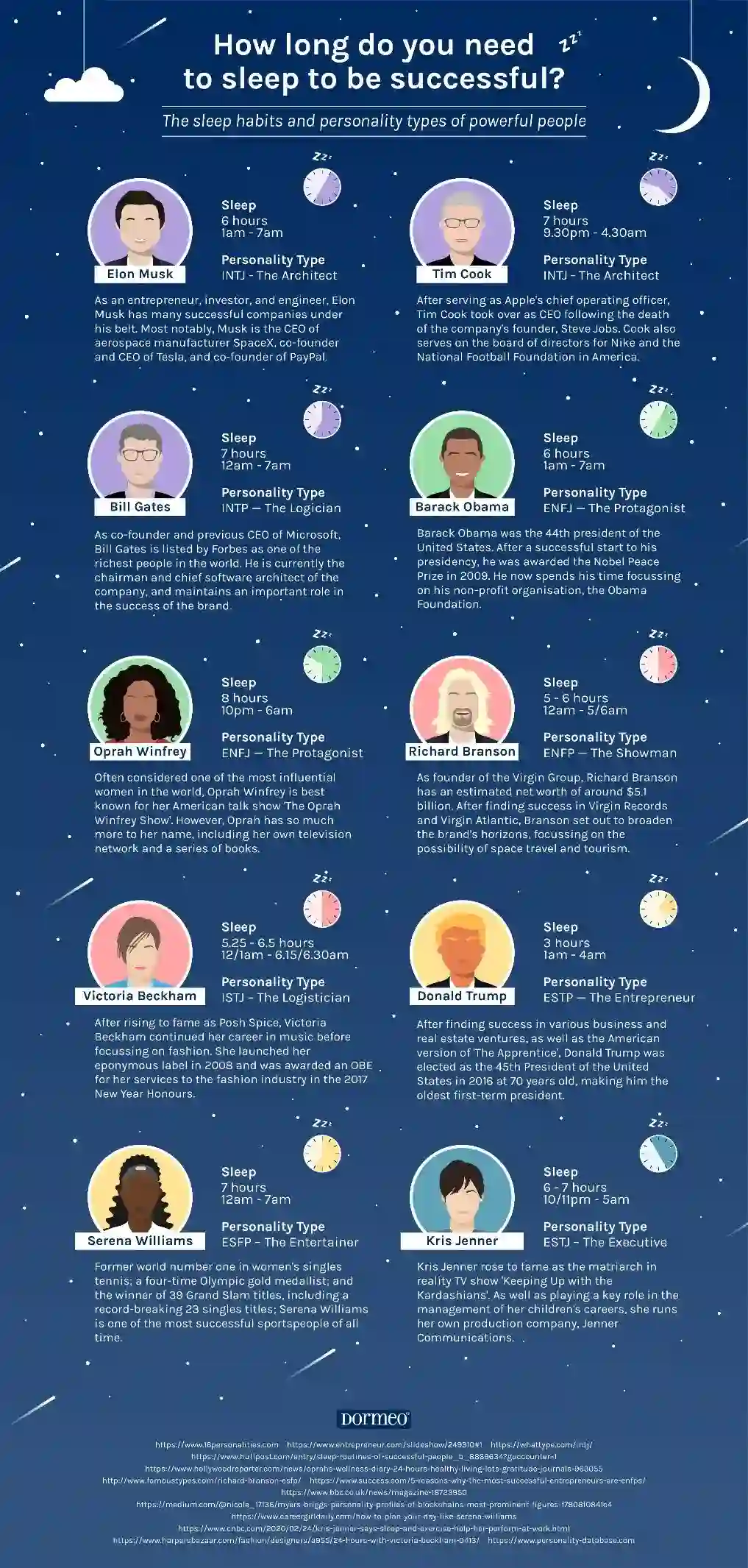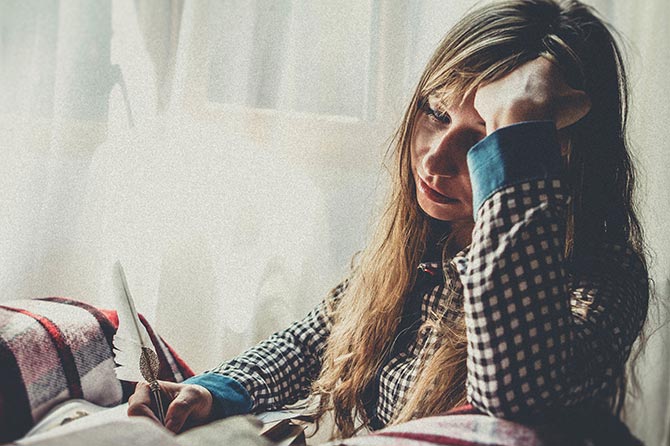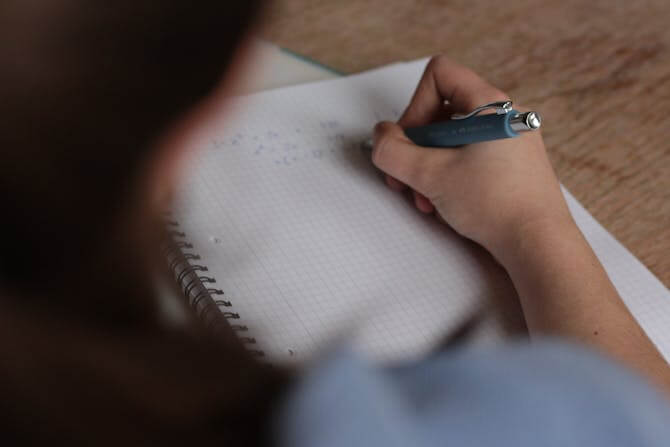
How much rest for success? 10 leader's sleep habits compared
When it comes to finding success in life, sleep plays a big role in making sure that you're rested and ready to face the day.
But, while experts say that an adult should get between 7–9 hours of rest every night (Sleep Council), some of the world's most successful people don't follow that advice, spending much less time asleep than is recommended.
To get a better sense of who's skimping on sleep and who isn't, we decided to look at the habits of ten highly successful people.
The people we've chosen range from politicians to sports stars to CEOs of huge companies, ensuring we get an insight into the routines of a diverse group of leaders.
We've also chosen famous people who match a variety of Myers–Briggs Type Indicators to ensure that we're getting a good balance of personalities and attitudes towards life.
This system assesses how someone perceives the world and makes decisions, before assigning them a personality type.
| Name | Role | Personality Type | Hours Slept Per Night |
|---|---|---|---|
| Elon Musk | CEO of Tesla and Space-X. | INTJ - The Architect | 6 Hours (1am - 7am) |
| Tim Cook | CEO of Apple. | INTJ - The Architect | 7 Hours (9:30pm - 4am) |
| Bill Gates | Founder of Microsoft | INTP - The Logician | 7 Hours (12am - 7am) |
| Barack Obama | Former President of the United States. | ENFJ - The Protagonist | 6 Hours (1am - 7am) |
| Oprah Winfrey | TV personality and media mogul | ENFJ - The Protagonist | 8 Hours (10pm - 6am) |
| Richard Branson | Found of the Virgin Group | ENFP - The Showman | 5 - 6 Hours (12am - 5/6am) |
| Victoria Beckham | Former popstar and fashion designer | ISTJ - The Logistican | 5.25 - 6.5 Hours (12/1am - 6:15/6:30am) |
| Donald Trump | Former President of the United States | ESTP - The Entrepreneur | 3 Hours (1am - 4am) |
| Serena Williams | Tennis player | ESFP - The Entertainer | 7 Hours (12am - 7am) |
| Kris Jenner | TV Personality and media mogul | ESTJ - The Executive | 7 Hours (10/11pm - 5am) |
As you can see, we've got a wide selection of high achievers on our list with a wide range of sleeping habits.
You can certainly see that some of these figures get by on very little sleep at all, especially Donald Trump (3 hours) and Richard Branson (5–6 hours).
On the other hand, we have some people, like Oprah Winfrey (8 hours), Serena Williams (7 hours), and Bill Gates (7 hours) who definitely stick to the expert's advice of getting between 7–9 hours' sleep.
It's also interesting to note that all of our famous faces are early risers, with no-one getting up after 7am every morning, suggesting that the early bird really does get the worm!
There's more variety in the bedtimes of our leaders, with Tim Cook (9:30pm) and Oprah Winfrey (10pm) being those that like an early night.
At the other end of the scale, Donald Trump, Elon Musk, and Barack Obama all go to bed at 1am, making them the night owls of the bunch.

How can you be successful on so little sleep?
Looking at the list of famous names and their sleep patterns, it's clear to see that not all these high-flyers think that they need to listen to the experts, with just half of the list getting 7–9 hours every night. But, are they wrong? How can they be so successful yet not get enough sleep?
Well, for the vast majority of people, having a rewarding career and getting healthy sleep are closely inter-twined.
Once you've had a good night's rest, you will be more productive, more creative, and less stressed throughout the day, giving you a solid foundation to excel in your job.
With less sleep, you can be sluggish, easily distracted, and prone to errors.
There is plenty of research to back up these conclusions, too. One study looked at the performance of sleep deprived surgeons, who made 20–30% more errors after sleeping badly.
Another study discovered participants were more distracted without rest. These reports are just a sample of a huge body of work that has established getting good sleep is a necessity.
But how are the Trumps, Bransons, and Beckhams of the world doing so well on so little sleep?
Well, there is also science that suggests that some people may be "short-sleepers" — able to get by with only a small amount of rest compared to others. A study by the University of California found that just 1% of people are able to function well while under sleeping, while a 2009 study highlighted that there was a genetic mutation that allowed people to get by with less sleep.
Sleep tips for career success
While you might look at this list of famous faces and think that it might be worth trying out life as a "short-sleeper", it's worth keeping in mind that they are likely to be a tiny minority.
Also, remember that half of our list got at least 7 hours each night, including Tim Cook, Bill Gates, and Oprah Winfrey, so there are plenty of ultra-successful people who get plenty of rest.
The likelihood is that you will be able to approach your work best when you're well rested. With this in mind, we thought we would share some quick tips for balancing sleep and your career.
Work next to a window
Leave your work out of the bedroom
Make your room a sleep haven
Take a nap
In a recent blog post, we took a look at a study that found staff slept better when exposed to natural light through the day. So, try to spend as much of your day near a source of light, such as a window or skylight, and you'll find it easier to sleep.
While it might be tempting to see what the latest work updates are in the evening before nodding off, you should try to keep electronic devices with screens away from the bedroom. This is because the blue light they emit can trick your brain into thinking it's still daytime.
Try to create the ideal sleep conditions in your bedroom so that you fall sleep faster.
It needs to be as dark as possible, between 16–18⁰C, and your bed needs to be comfy and supportive. This might mean you need to invest in blackout blinds and a new mattress, as well as turning down your heating.
Know you're going to be working late? Do you always feel sluggish after lunch? Then you might benefit from taking a power nap during the day. They are a well-known way to recharge your batteries and can help to top up limited sleep.
If you're the boss, you can probably take one, but if you're not, it may be worth discussing the benefits with your firm.
We hope you've found our look into the sleeping habits of successful people, as well as our look at the science behind short-sleepers.
A Dormeo mattress can make a huge difference. Being memory foam mattress specialists, our sleep experts know how to give you the best sleep possible.
Browse our fantastic range of quality mattresses like our hybrid mattresses and Octaspring mattresses, with the double and king size mattresses being our most popular.
If you have any questions, be sure to get in touch. Our blog and advice centre are also great resources for sleep information and insight.








Leave a Reply